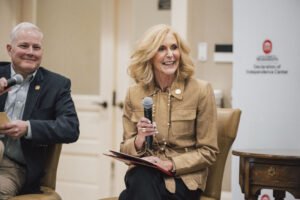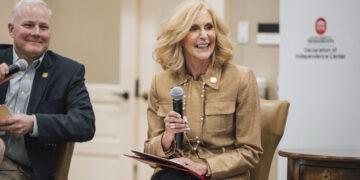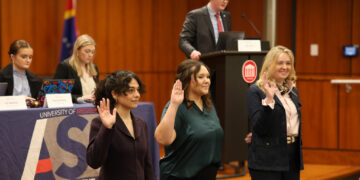
Mississippi Attorney General Lynn Fitch and Arkansas Attorney General Tim Griffin discussed federal overreach and the role of attorneys general in an address hosted by the University of Mississippi’s Declaration of Independence Center on Thursday, Feb. 13.
Fitch, elected to her second term as Mississippi attorney general in 2023, made history in 2020 as the first woman to serve as attorney general and the state’s first Republican attorney general in 150 years.
Fitch talked about her work on the Dobbs v. Jackson Women’s Health Organization case, which started in Mississippi and led to the Supreme Court’s decision to overturn Roe v. Wade in June 2022.
“We had an entire strategic plan,” Fitch said. “We were going to ask the question to overturn Roe v. Wade. We were going to say empower women and promote life, as they are not exclusive.”
Fitch also described her team’s filing of more than 200 lawsuits against the Biden administration, including suits about Title IX and partisan voter registration.
“We’re looking at not only the interests in our respective states, but we’re also looking at how does that affect everyone across our country,” Fitch said.
Griffin, Arkansas’s 57th attorney general, assumed office in 2023 following a career that included service in the U.S. Army, a term in the U.S. House of Representatives and a term as Arkansas’s lieutenant governor.
Griffin discussed the June 2024 overturning of the Chevron decision by the Supreme Court, which ended a precedent requiring courts to defer to agency interpretations of regulatory statutes. Although his office did not directlu work on the decision, Griffin said it now gives attorneys general a new “tool” to combat federal overreach.
“We do battle through words,” Griffin said. “We should battle through words and arguments in civil society, not violence.”
Griffin said the attorney general position has gotten easier with time.
“We’ve gotten better at the AG level,” Griffin said. “Some of that has to do with when you win and are successful, it sort of breeds more success.”
The two attorneys general said they collaborate on lawsuits and amicus briefs, which are legal documents submitted by a non-party to the case, especially for a cause they mutually believe in.
“We’ve all come together as Republican (attorneys general),” Fitch said. “We are very vested in working with one another.”
Fitch said the Declaration of Independence Center event hit close to home.
“It is always good to be back at Ole Miss,” Fitch, who earned both her bachelor’s degree and Juris Doctorate from the university, said. “This event was not only a great opportunity to discuss how states assert the rights of their people against federal overreach but also a wonderful opportunity to highlight the mission of the Declaration of Independence Center.”
The discussion ended with a Q&A session, in which the attorneys general addressed pressing legal and policy concerns.
One question focused on their response to Medicaid funding cuts.
While the state has not directly cut Medicaid funding, Medicaid expansion was denied by the Mississippi State Legislature in 2024. According to Mississippi Today, the state’s refusal to expand Medicaid caused a $1 billion loss for Mississippi.
Griffin discussed the complexities of budget decisions and the misconceptions surrounding funding cuts.
“Smart reform requires a lot of consensus,” Griffin said.
Fitch said that there is pending legislation in Mississippi addressing funding for Medicaid and that her office is collaborating with Griffin’s on a case surrounding insulin prices.
Another audience question addressed the increasing power of the presidency. Griffin said the public generally supports active governments, citing border security as an example.
Brighton Bensley, a first-year law student, attended the event. While he did not agree with all viewpoints presented, he said the discussion was valuable.
“Whether I support it or don’t support it, the people who made it happen were in the room today,” Bensley said. “I think it’s good to put faces to names and see them in the flesh.”

























